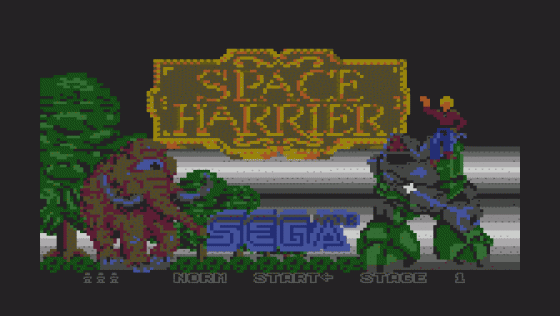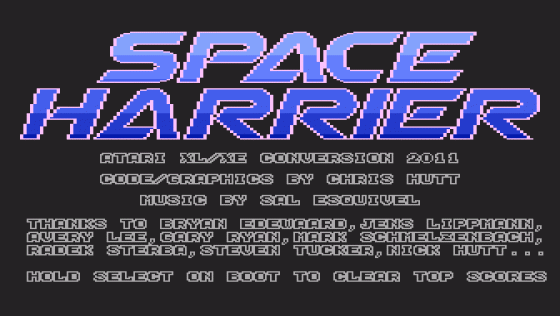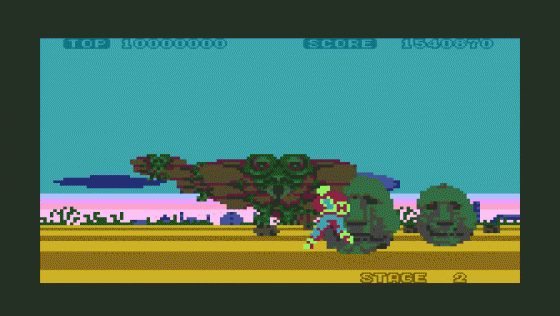
Micro Mart
 9th June 2011
9th June 2011
Categories: Preview: Software
Author: Shaun Bebbington
Published in Micro Mart #1161
Before the Commodore assembly programming tutorials return next week, Shaun squeezes in one more news update
Retro Mart: Space Harrier Nearly Here
One of the most impressive-looking arcade conversions for the mighty Atari XE/XL 8-bit personal computers is almost ready to be unleashed, and it's taken quite a few years to get it right. I suppose if a job's worth doing, it's worth doing well.
I am, of course, talking about Chris Hutt's port of Space Harrier, released into the arcade in 1985 by Sega. Chris's version will require 64K of RAM or more to run, which means that most of the more popular machines in the range will be ready to go.
Based in a land known as Dragon World in the year 6226, Space Harrier's a pacey 3D shoot-'em-up that sees you speeding through each zone armed with an appropriately powerful gun to obliterate everything in sight. The arcade original was noted for its great graphics when it was released, eating those old chunky 10p pieces like they were going out of fashion.
Considering that the Atari is less capable than the arcade hardware that hosted the game, Chris has done a really good job, and even the rather old playable demo available through his site is probably the best version of any of the official releases for other 8-bit home computers. Improvements have been made since, and luckily for Chris, his brother Nick is a former world recorder for the high score on the arcade original, so his input has been added to tweak this project to make it as close to the original as possible.
A full news update is available at www.sheddyshack.co.uk if you want to re-enter the fantasy zone on your old Atari.
RGB In 2K

Tom Dalby has announced the release of a rather fun-looking game, which he's created in just 2K of RAM for the Sinclair ZX Spectrum, in the style of the infamous Tetris or Columns. Both of those games will be familiar to any gaming veteran, but in Tom's iteration the object is to create combinations of red, green and blue to build a rainbow, which is displayed in the borders.
Each colour required is shown at the bottom of the play field. Of course, you'll need to know how RGB light colours work in order to play, and thankfully the old Speccy has a rather basic RGB palette already, displaying all of the possible outcomes of mixing the three colours together. Mixing the wrong colour will cause the collecting implements at the bottom of the screen to crack, and will eventually become unusable; if three are broken then it's game over. If you complete one rainbow, the game becomes progressively more difficult and there are eight stages in total to work your way around. That, we reckon, is pretty impressive stuff considering the memory constraints on this production.
To find out more and try this entertaining puzzle game for yourself, point your web browser at Tom Dalby's download spot, which can be found at the World of Spectrum forums.
Also For The ZX81
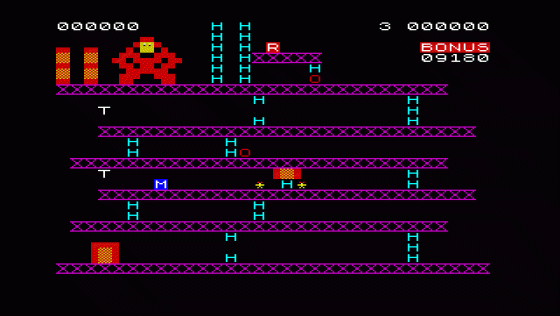
Due to the Sinclair ZX80's very limited specification, it was never much of a games machine, and in all fairness it was never meant to be either: the whole point of the original ZX was to be an affordable home computer for the masses (and not the classes) to allow those people interested enough to dip their toe into the world of personal computing.
Despite the technical woes associated with it, the pricing worked, and it was a minor success, leading to the creation of the ZX81 and Spectrum. One of the major issues was the 'screen flicker' in which the visual output would switch off every time something needed processing, such as input from the keyboard, or some mathematics. Some 'flicker-free' entertainment was eventually released for the machine, though, thanks to some clever machine code programming.
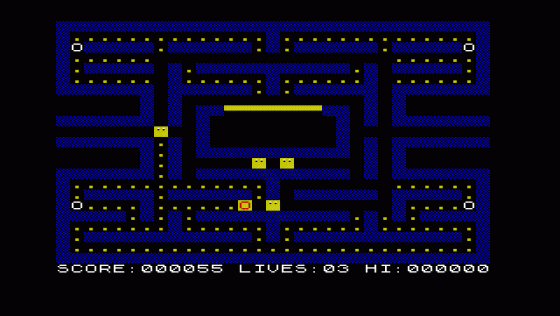
Paul Farrow has done a lot of research into the old white, membrane-sporting 8-bit, and has three excellent implementations of games running using the flicker-free technique, being [Donkey] Kong, Breakout and Pacman, along with all of the history and documentation needed to create your own arcade-style games on the ZX80. The site is superb, especially if you're interested in old computer hardware. Head over to www.fruitcake.plus.com right now. Oh, and I should point out that the games mentioned are available on the ZX81 too.
This article was converted to a web page from the following pages of Micro Mart #1161.

